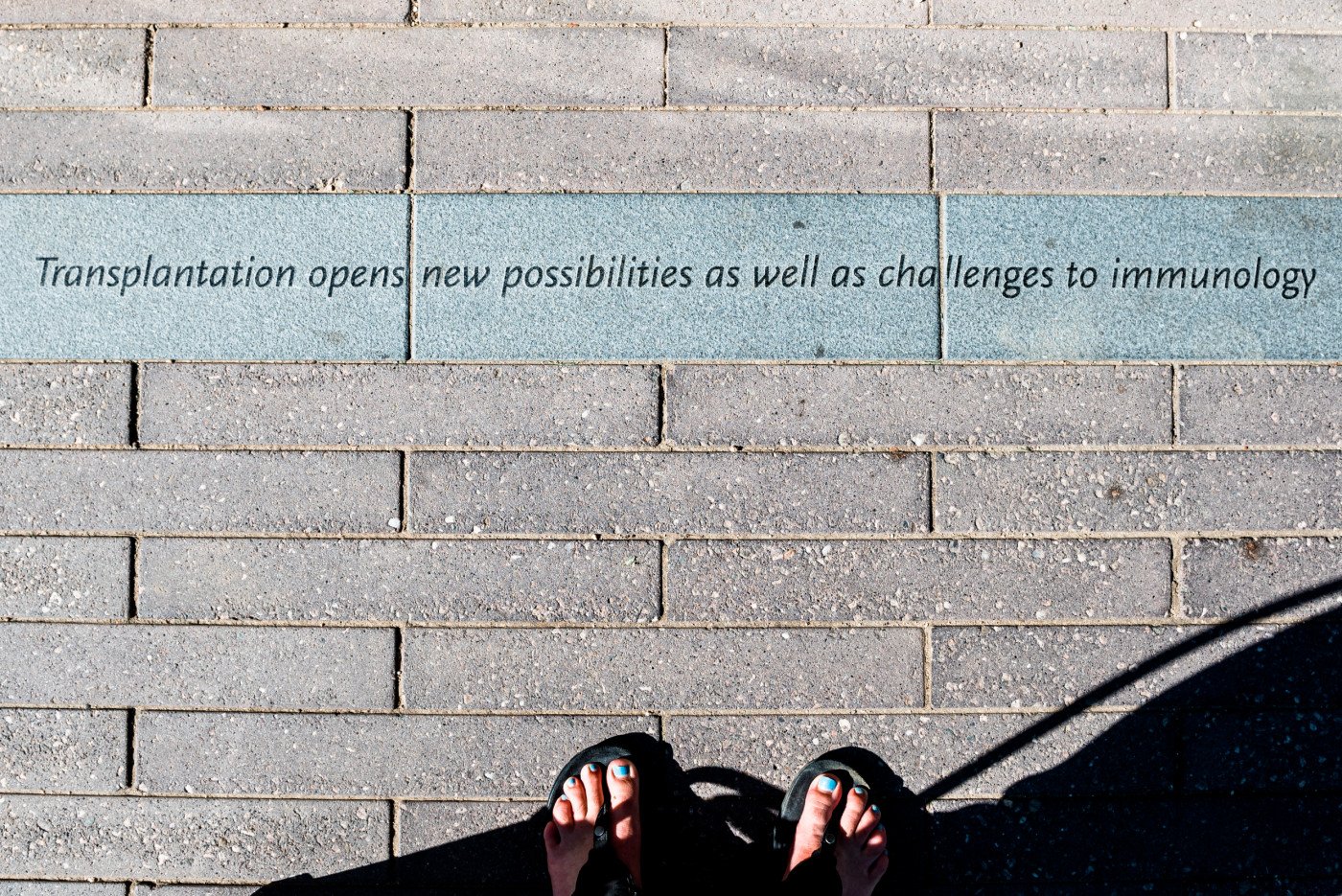Why I Avoid Congratulating Transplant Recipients

Kathleen, with chest tubes, at a portion of "Discovery Walk," an art installation at Stanford's School of Medicine.
When I tell someone I had a heart-lung transplant, I’m usually greeted with “congratulations,” unless they are particularly clueless and say, “Get well soon.” When I was dealing with intense postoperative pain and brain fog, it upset me to be congratulated on my “new life.” With multiple blood draws, tests, and appointments each week, it didn’t feel like much of a life in the beginning. Now when I meet recent transplant recipients, I have the urge to say the same, knowing how difficult and rare it is to survive the wait for a donor and the operation itself.
“Congratulations on your new life” does not acknowledge the value of the life before the transplant. I had 23 years of that “old life,” and I had grown fond of it. Life with pulmonary arterial hypertension (PAH) is not easy, but like most challenges, it can be an experience rich with unique opportunities. Everyone’s interests evolve with age, but many of mine developed because of my illness and the limited choices it gave me.
While my cabin-mates at summer camp swam in the pool, I did crafts. While I was at home with pneumonia, tethered to an oxygen tank, I did jigsaw puzzles and played board games. While my sister went to soccer camp, I took a web design course. Now that I need to exercise my new organs daily to maintain their function (and my sanity), I spend less time on art projects and board games. As frustrating as it was to be slowed by shortness of breath, I noticed more things when I moved through the world with PH, and would take photos on walks with groups, while surreptitiously catching my breath.
“Congratulations” does not acknowledge the spectrum of grief and celebration inherent to transplantation. It’s a continuous grief process that began with the loss of my organ donor. “The Call” offering me a heart and lungs en bloc, brought the knowledge that someone with A+ blood had died, that I might die in surgery, and that I might live to experience life without PH. Sixteen hours after my call, I lost the heart and lungs I was born with, and my pump, a machine that delivered life-prolonging medication to my heart for 17 years.
Recently I worried that, without refresher training, I could not perform the procedures I did while on the pump. Then I decided it’s OK for a 24-year-old with a liberal arts degree not to know how to mix intravenous medicine. Still, I miss having saline, gauze, and sterile bandages on hand, especially since my active post-transplant lifestyle seems to make me more prone to injury.
I love having the ability to chase after my dog, go on 9-mile hikes with my friends, and photograph 10-hour weddings with heavy equipment in tow. My post-transplant life is very much informed by my PH life, empowering me to appreciate falling asleep without an oxygen cannula, and changing clothes after showering, instead of sterile bandages.
Last month, my sister and I took our bikes to ride along the same path we rode so often as children, and later as teenagers. The slopes I previously perceived to be mountains are now gradual hills, and the ride that drained a full day’s energy barely ranks as a workout for my new organs. When I catch my breath with ease, I cry for the little girl with blue lips who had to learn before other kids to shift gears on a bike to make it up hills. I cheer for the transplanted woman who now can race her younger sister up those hills (and win fairly, sometimes), even if it’s 20 years late. I cry for my donor, because my new life is only possible because they lost theirs.
One night, while hospitalized after my transplant, I went for a walk with my dad and my IV pole. Stiff, cranky, and swollen from steroids, I was furious when dad said, “I am just so happy for you.” Like “congratulations,” his statement was an insufficient summary of complex emotions.
What I’d prefer to hear as a transplant recipient, and say to others in my situation, is difficult to summarize in a few words. The closest I’ve gotten is this: “I am so happy you are alive, and I know it isn’t easy.” Those of us living with chronic illness often see ourselves as a burden to others and don’t want our complaints to make us appear ungrateful. We need to be reminded that our lives are valuable. We need others to know that the fight is not over after an operation; it is ongoing, never easy, but full of opportunity.
***
Note: Pulmonary Hypertension News is strictly a news and information website about the disease. It does not provide medical advice, diagnosis, or treatment. This content is not intended to be a substitute for professional medical advice, diagnosis, or treatment. Always seek the advice of your physician or other qualified health provider with any questions you may have regarding a medical condition. Never disregard professional medical advice or delay in seeking it because of something you have read on this website. The opinions expressed in this column are not those of Pulmonary Hypertension News or its parent company, Bionews Services, and are intended to spark discussion about issues pertaining to pulmonary hypertension.








CEO Melissa Dumitru
Thank you for sharing this deeply personal story with us. As someone with PAH on flolan IV for 8 years now I too understand your perspective from healthy to PH patient and then onto transplant, the final therapy. The mix of emotions and the highs and lows of the entire journey can probably only really be understood by a fellow PH traveller. As someone who has chosen treatment only for the foreseeable future and is keenly aware that every day is a gift I take the next step very seriously. Transplant can be a bittersweet event, happiness and sadness rolled into a ball of mixed emotions. I wish you well on your new journey and something tells me your unique perspective will carry you gently into your future, so enjoy it. From the team at Phna.info in Australia
Tim Bossie
That is great encouragement Melissa! Not everyone has this type of attitude and can see it the wrong way.
Kathleen Sheffer
Yes, thank you, Melissa. I started on IV Flolan at age 6 so this is really the first time in my life I've experienced anything other than PH. Having struggled to adjust to life with chronic immunosuppression, I can only imagine what a transition it is to go from healthy to PH patient. I have endless appreciation for all the effort you put into staying alive on IV Flolan (my parents handled mixing until after I had switched to Remodulin, which is much simpler). So glad you are living life with PH, as rocky as it may be!